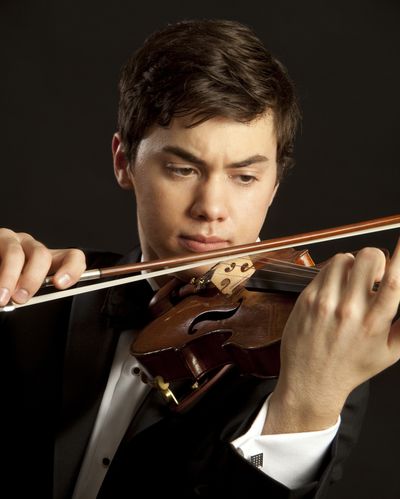Violinist has world as his stage
Well-traveled musician joins symphony for concerto, a familiar piece he aims to make new each time

Just a few days ago, violinist Benjamin Beilman was in Switzerland performing Ludwig van Beethoven’s violin concerto with the Zurich Chamber Orchestra. This time next week, he’ll be in Mexico City appearing with the National Symphony Orchestra. And in between those two concerts, he’ll be in Spokane, playing with the symphony. That kind of globetrotting is typical of Beilman’s busy schedule, and at 25, he’s already an in-demand chamber musician.
“You have to keep a lot of repertoire on your fingers,” Beilman said from his home in New York. “You have to be very quick at shifting mentally between different periods, different styles. It gets easier with experience.”
Beilman has been playing the violin for two decades now, taking up the instrument after his older sister – currently principal violist of the Sarasota Orchestra in Florida – started taking lessons. He’s performed all over the world, from London to Montreal to Malaysia, but this weekend marks his Spokane debut.
“I feel very fortunate that I had the opportunities to play as much as I did growing up,” Beilman said. “I sort of got used to the drill of traveling to play, meeting new conductors, meeting new pianists to play on very short notice, how to bring your musical integrity and combine it with someone very quickly.”
Along with guest conductor Robert Moody, Beilman’s Spokane appearance will highlight Finnish composer Jean Sibelius’ famous violin concerto, a piece that ranks among Beilman’s favorites.
“I’ve performed this concerto more than any other piece in my life,” he said. “Every time I come back to it, it’s interesting to see what different things come to mind – what things I’m prioritizing, what new things I find in the score. … Each time you come back to it, there’s a new layer you didn’t realize had existed before.”
Premiered in 1904, it was the only instrumental concerto Sibelius ever wrote, and he made one revision after another until he was finally satisfied with it. (Sibelius’ initial version was finished right before its premiere, and the featured soloist was supposedly unprepared for the unrealistic skill level it required.) Beilman says that Sibelius’ obsession with the concerto and his drive to perfect it likely ties to the composer’s own failure as a violinist, and it imbues the piece with a particular zeal.
“There’s such an intensity of emotion that Sibelius put into it,” Beilman said. “He had dreams of being a touring soloist as a violinist, but I think he came to violin in his teenage years, so he was kind of a late starter. Within a few years, he realized he didn’t have the training or the talent to make it work, so there was a lot of resentment and agony on his part about that violin.
“It clearly meant a lot to him. He was fixated with the violin, and I think he very much saw it as his medium to express his most personal ideas. … Lots of intense, passionate things happen within a short amount of time. It’s at times very volatile, but he also makes it very human. He connects all the different levels of human emotion at its most extreme.”
Beilman estimates that he’s played Sibelius’ concerto at least 25 times for different orchestras, and he says each new performance brings out something new in the piece.
“I hope I play it differently every time,” he said. “That’s the beauty of live performance. … There’s something inexplicable and amazing about a live performance, because each time it should be different – whether it’s different people, different orchestras, different moods, different times of year. There are so many different factors that go into affecting a performance.”